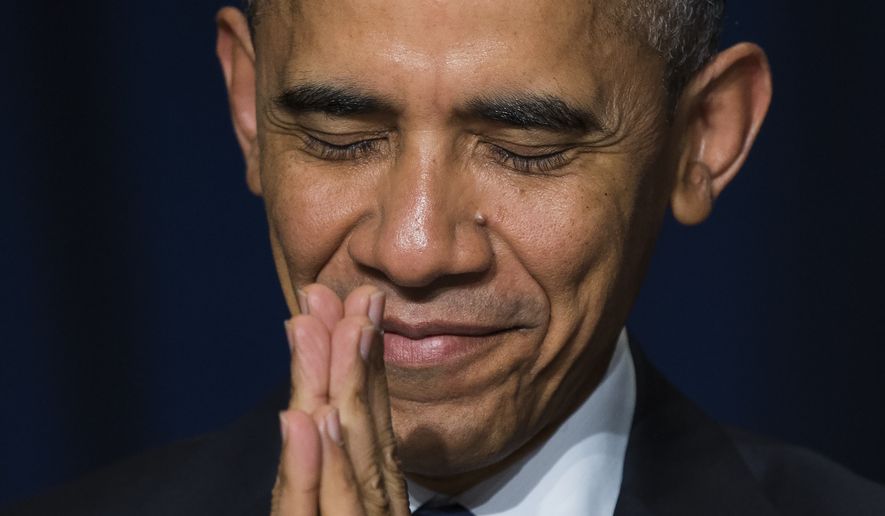President Obama won’t apologize for the U.S. attack on Hiroshima when he becomes the first sitting president to visit the site, but the White House wouldn’t say Tuesday whether President Truman made the right call in dropping the A-bomb in World War II.
Nor would White House aides say whether Mr. Obama would have used a nuclear bomb in similar circumstances, or any circumstances for that matter.
In announcing Mr. Obama’s visit to Hiroshima, Japan, on May 27, the White House tried to assure skeptics who are fearful of another presidential “apology tour” abroad that Mr. Obama would pay proper homage to the courage and bravery of the U.S. troops who fought and died in the war. Deputy National Security Adviser Ben Rhodes said Mr. Obama “will not revisit the decision to use the atomic bomb,” which killed about 140,000 people.
But the administration took pains not to endorse Truman’s decision, either.
“It’s hard to put yourself in that position from the outside,” said White House press secretary Josh Earnest. “I think what the president does appreciate is that President Truman made this decision for the right reasons. Given the way that President Truman approached this dilemma, and given the outcome, it’s hard to look back and second-guess him too much.”
The Hiroshima bombing, and one three days later at Nagasaki, forced Japan to surrender and averted the need for a costly ground invasion of Japan.
Truman said of his decision, “We have used it against those who attacked us without warning at Pearl Harbor, against those who have starved, beaten and executed American prisoners of war, against those who have abandoned all pretense of obeying international laws of warfare. We have used it in order to shorten the agony of war, in order to save the lives of thousands and thousands of young Americans.”
Asked by a reporter whether Mr. Obama would use nuclear weapons if necessary, Mr. Earnest did not say that he would.
“What the president has indicated is that we have a nuclear stockpile, and it’s one that should be maintained, both for safety reasons but also for readiness reasons,” he said. “The president’s first job is to protect the safety and well-being of the American people, and the president believes the best way to do that is to rid the world of nuclear weapons.”
Mr. Obama will visit Peace Memorial Park in Hiroshima with Japanese Prime Minister Shinzo Abe, who said he hoped “to turn this into an opportunity for the U.S. and Japan to together pay tribute to the memories of the victims” of the nuclear bombing.
“President Obama visiting Hiroshima and expressing toward the world the reality of the impact of nuclear radiation will contribute greatly to establishing a world without nuclear arms,” Mr. Abe told reporters.
Mr. Obama’s visit is intended to serve as a symbolic bookend to the nuclear disarmament agenda he laid out in a speech in Prague in 2009, shortly after taking office. White House aides say the administration’s nuclear deal with Iran is another key piece of that legacy, although critics in Congress and the Middle East claim the deal will allow Tehran to obtain nuclear weapons within a decade.
Mr. Rhodes said the president’s visit won’t change the administration’s pride in the U.S. armed forces who served in World War II. He said Mr. Obama will “shine a spotlight on the tremendous and devastating human toll of war.”
“To be sure, the United States will be eternally proud of our civilian leaders and the men and women of our armed forces who served in World War II for their sacrifice at a time of maximum peril to our country and our world,” Mr. Rhodes said. “Their cause was just, and we owe them a tremendous debt of gratitude, which the president will again commemorate shortly after the visit on Memorial Day. This visit will offer an opportunity to honor the memory of all innocents who were lost during the war.”
Asked whether the Japanese should reciprocate this year by marking the 75th anniversary of their attack on Pearl Harbor, Mr. Earnest replied that he didn’t know “what the Japanese may do to mark that occasion.”
Peace groups are urging the president to use the visit as a platform to announce unilateral reductions in the U.S. nuclear arsenal.
Kevin Martin, executive director of Peace Action, said Mr. Obama should take steps to reduce the number of nuclear warheads in reserve and strategic warheads, remove nuclear weapons from “hair-trigger alert” that allows them to be launched within minutes and cancel a long-range nuclear cruise missile program.
“Obama will look insincere if his words espouse ridding the world of nuclear weapons while at the same time his administration continues its plan to spend $1 trillion over 30 years to upgrade nuclear weapons,” Mr. Martin said.
The president will be in Japan to attend his final Group of Seven summit in the city of Ise-Shima. He will also visit Vietnam on the trip.
• Dave Boyer can be reached at dboyer@washingtontimes.com.




Please read our comment policy before commenting.